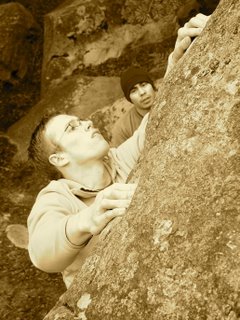Replies to an eMail discussion
Maybe what we are seeking is something unique. Maybe something close to perfection, but still unique. If it was possible to play a perfect symphony, then it would be possible for two groups of people to play a perfect symphony. This would therefore make the symphony generic. It would no longer be unique.
Tim:
Yes, I originally started with the idea that "uniqueness" is the true definition of beauty... but then of course, something very crass and ordinary can also be unique. but what is it about the "unique" performance of a particular orchestra that makes it truly beautiful? is it just because they played the right notes? (of course not) is it because they played with passion and made nice phrasing? (even a marching band can play with passion). No, somehow this orchestra was able to convey some deep emotion... present a clear window into the human psyche... Like you said: they were able to stir something deep in the gut of the audience. That is the best definition of beauty that i can come up with: effective communication of a human emotion.
Ryan:
I don't know what we are looking for in aesthetics, perhaps it is yet another heart felt facet from another human being to add to our collection. Maybe we are always looking for something original. Or maybe something that is more original, closer to the original.
Tim:
Well, actually the basic idea of aesthetics as I understand it is pretty straight-forward... in aesthetic we are looking for the reasons why we find something pleasing (or beautiful). So my question is: is beauty just something that makes us feel "warm and fuzzy" or is it something deeper... the only good answer I can find so far is that something is truly beautiful when it touches someone else deeply and in a positive way.
Marty:
"Beauty" is another beast entirely. There are very few, if any, universals in the realm of beauty. Some may like the look of a sunset, but others have been born blind, so a sunset is meaningless to them. Some may enjoy the scent of perfume, while others may acquire a headache from smelling the same scent. Beauty really is in the eye of the beholder, or in the brain, rather.
Tim:
I think that this is an important example in support of my idea that beauty has more to do with effective communication than anything else: every sentient being should probably (i have no reference for this) be able to experience beauty. And so what about a person born blind and deaf? What would he/she find beautiful?? Beauty is probably connected most closely with two things: effective communication and positive emotions. Thus, I imagine that a deaf/blind person would find something beautiful if it "communicated" as much positive sensory information as possible... a warm hug, sex, well-prepared food....
Marty:
Because I feel that perfect beauty can't exist, I don't think the question of why perfection is not always beautiful to us is a very valid one, or at least not a very useful one.
Tim:
Perhaps not valid in discussing "perfect beauty", but wouldn't it be quite useful in discussing the tools to make something MORE beautiful. Or it could also be valid and useful in redefining our aims and goals as artists.
Marty:
The brain seeks balance, but balance does not have to mean symmetry, as the rule of thirds and the golden mean are anything but symmetrical. Furthermore, one's aesthetic sense is largely the result of the things to which one has been exposed during one's past life. Some of these things elicit pleasureable memories and feelings, and some, not-so-pleasant, but possibly still nostalgic ones. Exposure to some things will allow a person to appreciate other things more than if they had not been previously exposed, thereby enhancing their aesthetic sensibilities.
Tim:
But there do seem to be certain aesthetic values that are shared by large groups of people (across cultural boundaries even) that must prove that aesthetic sense is not only the result of past experiences. Unless you are talking about the more general "human experiences" that are shared by all. In that case I would agree that these experiences probably shape our aesthetic sense as humans.
Chris:
I guess that's because I still would think (maybe you do too...?) that there are still many times where the more perfect a version of something, the more beautiful (I imagine enjoying a piece played by a better instrument at least as well, if not sometimes better, than one of the more rudimentary ones like you mentioned) it may be to me, at least.
Tim:
yes, music played on a more advanced instrument WOULD sound more complex.... or more perfect... or maybe more pleasing; but does this mean it is more beautiful??? we just discussed that beauty isn't all about being PLEASED, because even Baroque paintings of Jesus suffering on the Cross, or even modern paintings such as Picasso's 'Guernica' would probably not be called 'pleasing'. But many call them beautiful.
well, anyway, i'm not into dissecting something until it's meaningless and boring... i just think that if people thought about beauty in another way it could have a big impact on the world:
- audiences wouldn't walk out of a concert just because the music isn't something they are used to... not "pretty" or "soothing". Music doesn't have to be pretty or soothing to be beautiful!! but that is something that we are not taught from childhood.
- people would appreciate fine things like good food, or good art... not because they look "pretty" but they would search for deeper meaning... try to connect with the emotions of the artist. that's really all we are after as artist. we want to communicate something with others... something from the heart.
that is true beauty.
*****************************
Any other takers on this topic?























